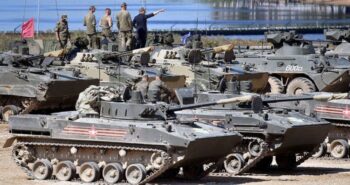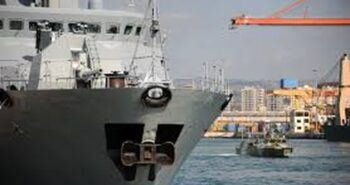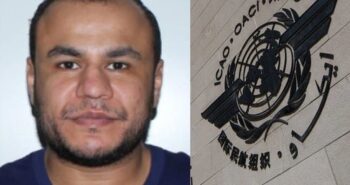The Libyan Organization for policies and strategies, which is an independent, non-profit, non-governmental organization, publishes monthly reports on the situation in Libya. This is part two of the February report on security and military situations in Libya.
***
As the case since the beginning of the political and military crisis in Libya, the issue of illegal immigration is of important interest to European countries as well as Libya’s neighbouring countries.
Given the special interest “Italy” gave to this issue, it managed to sign an agreement with the Presidential Council in Government of National Accord to control borders and combat illegal immigration and smuggling operations in general.
The memorandum is an activation to a previous treaty of friendship, partnership, and cooperation concluded in 2008, and stipulates supporting the Government of National Accord in controlling and monitoring the borders, especially the southern ones.
It also stipulates Italy’s support to the development programs in the Libyan areas damaged by migration. The Presidential Council underlined that the procedures to be taken will not affect the Libyan social fabric or threaten the country’s demography.
The treaty signed between the two countries sparked controversy and speculations among observers and State’s personalities. Many believe that the memorandum paves the way to resettle illegal immigrants in Libya, as stated by “Hanan Shallouf”, a boycotting House of Representatives member.
The Presidential Council and the Italian government activated the Joint Operations Room which is represented by Colonel “Tarek Chanbour” from the Libyan side and the Italian Ambassador “Giuseppe Perrone” to exchange information about illegal immigrants.
In the context of fighting against migration, “Malta” demanded from EU countries to increase the funding to the UN Migration Agency in order to deport immigrants from Libya to their countries. The Italian Minister of Foreign Affairs, “Angelino Alfano” announced the European Union’s desire to reach an agreement with Libya on migration, similar to the agreement concluded with Turkey. Italian intelligence indicated, in its report on information security policy of the year 2016, that the route in the Mediterranean Sea, which connects North Africa and Italian coasts, was the main route of migration to Europe.
Therefore, Libya constitutes an important start point for migration towards Europe. In the same context, the Austrian Foreign Affairs Minister, “Sebastian Kurz” called for the need to cooperate with Libya in addressing the crisis of immigration and seek possibilities of deporting immigrants to their countries of origin.
On another side, an internal report prepared by EUBAM- Security team revealed the difficulty of establishing a practical cooperation between EU and Libya in the field of borders control and reinforcing the capacities of security and judicial agencies in the country. This hardship is due to the situation in Libya which is under the control of rival parties. Furthermore, there are no security, judicial, administrative or custom institutions through which EU could cooperate in the field of security.
According to a report released by the United Nations International Children’s Emergency Fund (UNICEF), many children are crossing Libya, migrating towards “Italy”. These children are subjected to serious violations conducted by smugglers.
UNICEF stated that twenty-six thousand children crossed Libya last year, most of them are unaccompanied. Moreover, the report stated that among the 34 migrant shelters, three are situated in the heart of the desert, and are poorly equipped. In these shelters, children are mistreated and women are sexually harassed, besides the existence of other illegal practices.
The European report recommended dealing only with legitimate entities which can be held accountable and have the minimum standards and guidelines for public administration.
In the framework of upgrading the migrant shelters in Libya, the International Organization for Migration (IOM) held a training program targeting directors and staff members of several shelters in Libya, to foster their capabilities in providing good services to immigrants. “Combating Illegal Migration” Center for the region extended from “Tokra” to “Al-Magroun” in the eastern region announced the deportation of 2800 illegal immigrants across “Msaed” border crossing with Egypt and the branch of “Combating Illegal Migration” in “Sabha” in 2016.
Expectations
European countries will continue putting pressure on Libya to reach solutions about the crisis of illegal immigration. Given the weakness of the Libyan State and power, agreements with other countries are unlikely to be in favour of Libya.
Even if European countries could sign agreements with Libya, the institutional weakness the country is suffering would constitute a real obstacle to their implementation. Also, it will be difficult to control local smuggling gangs, those of influence in their regions and cities. Furthermore, it is hard to monitor the southern borders, which are controlled by several groups. The series of migration will exhaust Libyans and neighbouring countries for a long time.
The Security Institutions
The situation of security institutions has not changed much compared to previous months as they are still vulnerable and unable to perform their functions because they are controlled by different regionalisms and militias.
The Chairman of the Presidential Council in the Government of National Accord demanded the need to train and rehabilitate armed groups to be able to regulate the security institutions. He pointed out to the weak international efforts in this regard. In this sense, “Serraj” presented a formal request to the NATO to help build Libyan Armed Forces. In this same context, the U.S. Ambassador to Libya “Peter Bodde” stated that his country is willing to support Libya in building a professional and unified army that is subject to the civil authority of Libya.
Security institutions continued to produce new batches as it has done for years, most recently a batch at the camp “Al-Saeqa” in “Benghazi” to protect personalities and secret attribution.
The motorcade of the Presidential Council Chairman in the Government of National Accord “Fayez Sarraj” was shot at while on the highway in the capital “Tripoli”.
“Sarraj” was accompanied by the Chairman of the High Council of State and the Commander of Presidential Guards “Najmi Al-Nakoua”, who was injured following an attack carried by two individuals from the guards, according to the media office of the High Council of State. “Sweihili” accused the Prime Minister in the National Salvation Government “Khalifa Ghwell” for being behind the attack. The latter denied the accusation in a statement he gave about the incident.
The security apparatus was not able to reveal the circumstances of several criminal cases of kidnapping, murder, and other crimes. It was neither able to arrest those involved in them, nor to track and hand them over to justice.
Expectations
The political situation in the country is most likely to continue to negatively influence the security institutions in terms of rehabilitating and supporting them in providing security, reducing crimes, and protecting citizens.
Most importantly, the situation is exacerbating as all the various parties are trying to control the security institutions and adapt them to serve their interests. Western promises about supporting Libya to reform and build its security institutions will not help, as most of these statements do not go beyond promises and media statements, which bodes for the continued spread of crimes and security chaos.
The Armed Groups
Kidnapping for money, trafficking in alcohol and drugs have not stopped.
Armed groups are behind many of these practices in several cities and in particular, the capital “Tripoli”, in which kidnappings for money is carried on in several areas in the suburbs of the city. Often, armed groups from “Wershfana” are behind these cases. One robbery case in the area of “Janzour” in western “Tripoli” caused bloody clashes at the beginning of February between “Forsan Janzour” Battalion and armed groups from “Wershfana”.
In its annual report, Amnesty International stated that armed groups, associated with the existing governments in the country, committed serious violations to international law and human rights. It added that different forces used weapons which lack precision leading to the killing and wounding of dozens of civilians in various cities.
The organization accused both sides of the conflict in “Benghazi” of carrying out inaccurate attacks, following which innocent civilians were killed.
It also accused the army in “Benghazi” of launching air strikes targeting trapped civilians. Amnesty International stated in its annual report that armed groups associated with all parties to the conflict kidnapped civilians and detained them because of their views, origins or their political or tribal affiliations.
The organization indicated that amid the lack of law and judicial system, kidnapping cases for ransom increased in “Tripoli” and other cities as well.
The European Union Border Assistance Mission in Libya (EUBAM) report talked about the presence of more than 1500 militia groups in Libya and that militias control most of the security institutions in the capital “Tripoli”. Moreover, the report stated that the Ministry of Interior in “Tripoli” is also under the control of armed militias.
Expectations
The European Union is unable to work with Libyan security agencies because the latter are controlled by armed groups. This situation reflects the extent to which the spread of these undisciplined groups has impacted the current situation in the country.
Since security institutions are unable to perform the duties entrusted to them – for reasons previously mentioned- these armed groups will always find the space to act outside the boundaries of law and practice criminal offences against citizens and State institutions.
***
Source: The Libya Case Report – February 2017
______________




